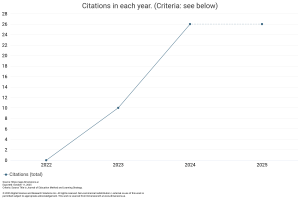Reflective and Technology-Integrated Pedagogy for Mathematics Teacher Education
DOI:
https://doi.org/10.59653/jemls.v3i02.1587Keywords:
reflective pedagogy, technology integration, mathematics teacher education, professional development, TPACKAbstract
This study explores the integration of reflective pedagogy and technology-enhanced instruction in mathematics teacher education. In response to the growing complexity of 21st-century classrooms, teacher preparation programs must equip educators with the capacity for critical self-assessment and technological proficiency. This research adopts a library research approach by systematically reviewing relevant literature from scholarly journals, books, and academic reports. Through thematic analysis, five key findings were identified: (1) reflective practices promote continuous professional development, (2) technology integration increases student engagement and conceptual understanding, (3) the combination of reflection and technology strengthens teachers’ technological pedagogical content knowledge (TPACK), (4) collaborative and reflective professional development enhances instructional implementation, and (5) integration challenges such as lack of confidence and pedagogical alignment require ongoing support. The study concludes that merging reflective pedagogy with technology integration creates a comprehensive framework for preparing adaptive, self-aware, and innovative mathematics educators. This integrated model provides valuable insights for the design of teacher education programs and underscores the need for professional development structures that foster both reflective and technological competencies. Future empirical research is recommended to validate these findings in classroom contexts and to assess their long-term impact on teaching outcomes.
Downloads
References
Adler, J. (2011). Professional Knowledge Matters in Mathematics Teaching. https://doi.org/10.1142/9789814324359_0186
Agnes, T., Asrowi, A., & Sutimin, L. A. (2019). Enhancing Students’ Learning Motivation by Applyıng Reflectıve Pedagogy to Modules for Junıor High School. International Journal of Psychology and Educational Studies. https://doi.org/10.17220/ijpes.2019.03.011
Campbell, B. (2018). Multilayered Reflections of a Social Justice Bricoleur: Becoming More Purposeful in My Postgraduate Pedagogy. Educational Research for Social Change. https://doi.org/10.17159/2221-4070/2018/v7i1a2
Choi, J., & Sunwoo, J. (2024). Changing Professional Noticing in Maths Lessons Through Professional Development Program Using Educational Technology. Kor SCH Mathematics Soc. https://doi.org/10.30807/ksms.2024.27.4.010
Golding, J., & Kabuye Batiibwe, M. S. (2020). A Design Approach to Mathematics Teacher Educator Development in East Africa. Jramathedu (Journal of Research and Advances in Mathematics Education). https://doi.org/10.23917/jramathedu.v6i1.11898
Hughes, J. E., Cheah, Y. H., Shi, Y., & Hsiao, K. (2020). Preservice and Inservice Teachers’ Pedagogical Reasoning Underlying Their Most‐valued Technology‐supported Instructional Activities. Journal of Computer Assisted Learning. https://doi.org/10.1111/jcal.12425
Kafyulilo, A., Fisser, P., Pieters, J. M., & Voogt, J. (2015). ICT Use in Science and Mathematics Teacher Education in Tanzania: Developing Technological Pedagogical Content Knowledge. Australasian Journal of Educational Technology. https://doi.org/10.14742/ajet.1240
Kersaint, G. (n.d.). Reflections on a Course Designed to Encourage Technology Integration in Secondary School Mathematics. https://doi.org/10.4018/978-1-61520-897-5.ch016
Na, S., & Dapat, R. O. (2023). Professional Ability System and Effective Strategies in Enhancing Teaching Competence Among Mathematics Student Teachers. Journal of Education and Educational Research. https://doi.org/10.54097/jeer.v5i3.13674
Picado, M., Loría-Fernández, J. R., & Espinoza-González, J. (2022). Teacher Reflection on a Teaching-Learning Situation Regarding the Concept of Relation in Secondary Education. Uniciencia. https://doi.org/10.15359/ru.36-1.2
Reeder, S., Utley, J., & Cassel, D. K. (2009). Using Metaphors as a Tool for Examining Preservice Elementary Teachers’ Beliefs About Mathematics Teaching and Learning. School Science and Mathematics. https://doi.org/10.1111/j.1949-8594.2009.tb18093.x
Reichert, J. T., Couto Barone, D. A., & Kist, M. (2020). Computational Thinking in K-12: An Analysis With Mathematics Teachers. Eurasia Journal of Mathematics Science and Technology Education. https://doi.org/10.29333/ejmste/7832
Reyes, W. M. (2021). Filipino Pedagogies From Social Mimesis. The Normal Lights. https://doi.org/10.56278/tnl.v15i2.1855
Starčič, A. I., Cotič, M., Solomonides, I., & Volk, M. (2015). Engaging Preservice Primary and Preprimary School Teachers in Digital Storytelling for the Teaching and Learning of Mathematics. British Journal of Educational Technology. https://doi.org/10.1111/bjet.12253
Suh, J., Sprague, D., & Baker, C. K. (2019). Transforming Mathematics Teacher Knowledge in the Digital Age Through Iterative Design of Course-Based Projects. https://doi.org/10.4018/978-1-5225-7918-2.ch017
Downloads
Published
How to Cite
Issue
Section
License
Copyright (c) 2025 Yuyun Alfasius Tobondo

This work is licensed under a Creative Commons Attribution-ShareAlike 4.0 International License.
Authors who publish with this journal agree to the following terms:
- Authors retain copyright and grant the journal right of first publication with the work simultaneously licensed under a Creative Commons Attribution-ShareAlike that allows others to share the work with an acknowledgement of the work's authorship and initial publication in this journal.
- Authors are able to enter into separate, additional contractual arrangements for the non-exclusive distribution of the journal's published version of the work (e.g., post it to an institutional repository or publish it in a book), with an acknowledgement of its initial publication in this journal.
- Authors are permitted and encouraged to post their work online (e.g., in institutional repositories or on their website) prior to and during the submission process, as it can lead to productive exchanges, as well as earlier and greater citation of published work (See The Effect of Open Access).
























